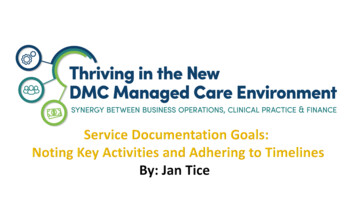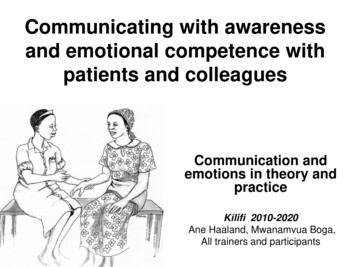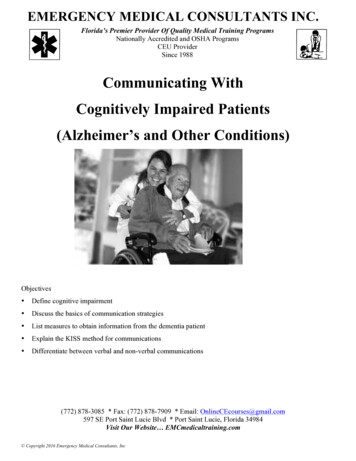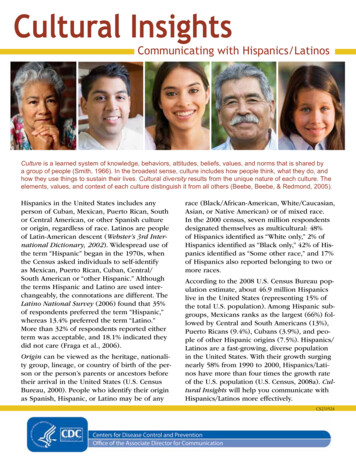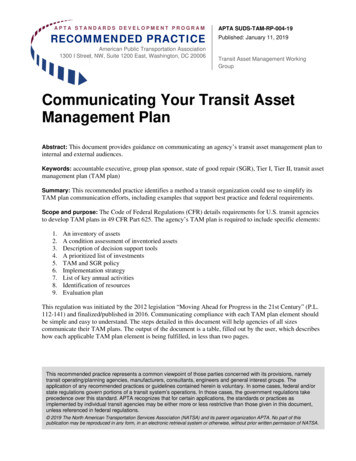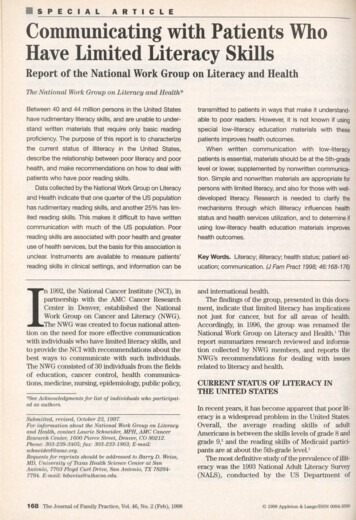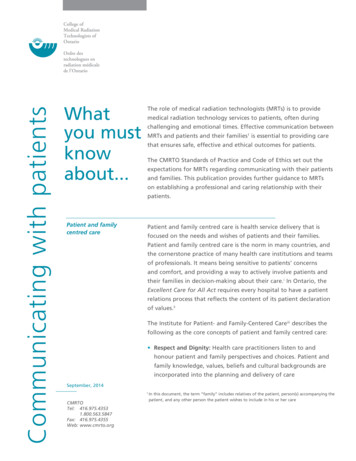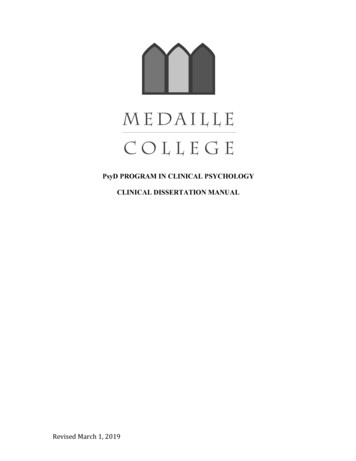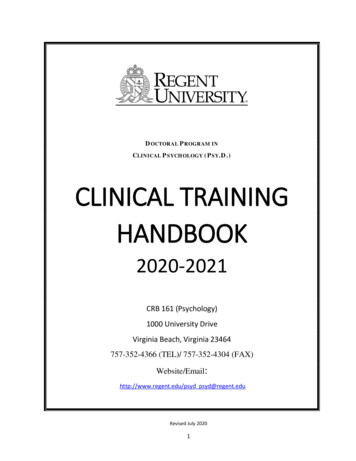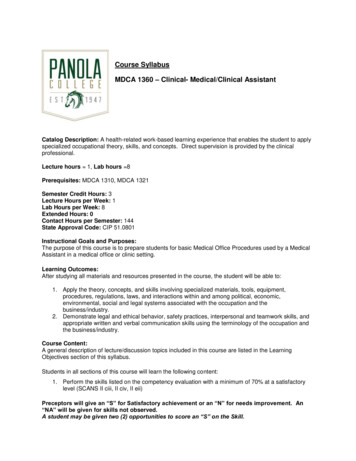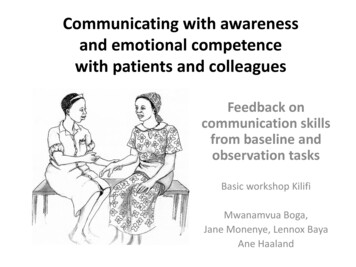
Transcription
Communicating with awarenessand emotional competencewith patients and colleaguesFeedback oncommunication skillsfrom baseline andobservation tasksBasic workshop KilifiMwanamvua Boga,Jane Monenye, Lennox BayaAne Haaland
Contents Strengths when Communicating with parents,patients, colleagues and supervisors Effects of communication Information and communication you give topatients and colleagues, and how you help themunderstand Communication skills challenges, and perceivedcauses of the problems Insights/MSC Learning needs
Using good communication skills
Which skills are you good at with patients?All participants acknowledge some strengths. Main trends:Listening(9) “Am a good listener e.g. I can listen patiently to someone talkfor a long time without interrupting or cutting them short soas to get the full information.”Giving instructions/explaining reasons (6) “I am good at explaining the reasons for taking drugs correctlyas prescribed and also nature of disease. Example I had apatient who didn’t want to take HAART, yet she was eligible Iexplained to her the importance at length and finally sheagreed”
Other skills you are good at Greeting/creating rapport/make patients comfortable (4) Deal with fear and anxiety (2) Communicating in patient’s own language/be at the samelevel/take time (4) Giving feedback-2 Empathy -1; Openness-1 “I am good at creating rapport. Ex: I start by greetings, ifpossible handshaking, then introduce myself by even givingmy name, then proceed”
Good skills with colleagues/supervisorsCommon skills Listening to colleagues (13), to supervisor (1) Communicating with respect (4) Giving good feedback Handing over clear report to colleagues Other skills: questioning (2), respect and ask supervisor foropinion (2), seeking to understand others views (2), Passinformation (2)
Skills you are not so good at Listening (12)Handling emotions (6)Listening and asking question (3)Interpreting non-verbal communication (2)Other (1): Giving constructive feedback , Respect, Patience ,Convincing patients , Judgmental “I am not good at listening to long stories especially duringadmission. I get irritated so fast so I will only take what isimportant”
Effects of good communication on colleaguesand patients
Effects of good communicationon patientsPatients understand instruction and cooperate in care (9) “That elaborative and simplified explanation made the mother of thechild with a head control problem understand the problem the use of acervical collar and co-operate in the treatment plan, hence the childgains head control”Open up and motivation to communicate freely/confidence (5) “My giving the mother an ear, she gained confidence that at leastsomeone listen to her”Reduce patients anxiety and fear (2) “The mother who appeared anxious initially now looked calm andopened up to me and we communicated freely concerning her child”
Effects of good communicationon colleagues and supervisorsGood relationships (mutual understanding) (11) “There was harmony at work, we understood one another well’Appreciation/Respect for one another (5) “In both situations they showed appreciation and I did notsense bad reaction”Confidence and trust in one another (3) “He gained a lot of confidence with me, I carried out theinspection on the specified areas and compiled a report which Ipresented to my supervisor, he took it forward to the plan hencehelped the specific health centre to improve in this in thestandard provision of health care”
Information and communicationto patients
What info do you give patients At admission: Emotional care: Information that deals with patients’ fear and anxiety (11) “I create a rapport with the parents and thank them forbringing the child to hospital. I ensure they are aware that thechild is very sick and assure them that the medical team willgive their best. Then after settling the child in bed I do anorientation of the ward, where bathrooms are etc” “Acknowledge and calm the patient: that what the parent hasdone is the best, so as I alleviate any guilt feelings, reassuringthat we are going to do our best at our capacity and perhapsrefer when appropriate; Educate the client on the condition.”
At admission Medical information (7) “I will inform the parent of the nature of illness of herchild and the possible diagnosis. I will inform herabout the treatment the child has been prescribed, Iwill inform her about lab investigations for her child” Others: describe measures that could reassurepatients: Orientation to ward environment (2); andfeedback on progress
How do you make patients understandinformation?Give information in clear way/simple language (6) “I try and explain things in a simple way, usually repeat what Ihave said, ask them if they have understood and sometimesask them to repeat what I have said.give them a chance toask question. While doing this, examine their facialexpressions”Explaining importance of the information (2) “I try to let them know why they need to act in certainmanner/when they gain from following the advice Ask them to repeat (3)
How do you make patients understandinformation?Creating conducive environment, talking to themnicely/friendly (4) “Before I give them advice, I create an environment which isconducive and tend to create an interpersonal relationshipbetween the parent and myself e.g. I can start by creating ajoke which makes the parent laugh then there I start myspeech”Explain, then ask for return feedback question (3) “I explained to them and ask them questions and make surethey understand, and also give them time to ask me questionsto verifying any query they have”
Why do patients follow advice?Explained the benefits/importance and outcome (17) “When the parents become comfortable with the situationand are ready to work with you and are willing to worktogether”Others: when you listen to them, HP confident, show emotionalsupport
Major communication challenges
A. Providers’ own limitationsThe majority (22) felt the problems they are encountering arerelated to their own lack of skills:Lack of communication Skills (10) “The cause of the main communication problems is lack ofcommunication skills and we need to be sensitised, taught on goodcommunication skills “Lack of skills to handle own and patients’ emotions (12) “I become judgmental because of the traditional charms on thechild’s waist whereby I told the mother to cut it before I could attendto her” “I think mainly communication becomes a problem when we don’tknow how to deal with our self in the 1st place.Other challenges Hierarchy/superiority complex (9) Not patient (1); Judgmental (1 )
Challenges: Supervisors “There are times they don’t want to listen,especially the supervisor, they have thetendency that a junior cannot tell themanything”.
Learning needs How to manage emotions – mine, others’ How to handle angered relatives/patients Control anger – “I am still very far but I am trying mybest” How to control stress Handling terminally ill patient How to manage short tempers “I need to be patient, not act out of impulse, betolerant, calm and have confidence in tryingsituations”.
Asking questions “I have a challenge in asking questions to find out more what theother one is saying, Most of my questions are close ended requiringyes/no answer. When I let my feelings take control over me I end upbecoming impatient ask close ended questions, hence not listen towhat the person is saying” “I listened attentively and framed my questions well, to avoidjudging her. I did not want to interrogate her; this could have scaredher to open up. So I avoided questions like “why", and used "How',"what”, in order to make her talk out her issues” “I feel most of my patients do not have time to explain more onwhat their problems are because I don’t give them time to do so.” “I later realized that I had been harsh to others, quick to blameother people for any mistakes that happens, not realizing that Icould have also contributed to the outcome of the incidence”
Have we captured the main issues?Do you have questions?
Additional examples
Insights on how to communicate “It was amazing that I could give her a lot of time justlistening to her without interrupting . . It was amazing tome how just listening could work magic” “I learnt to consciously watch my form of non-verbalcommunication that may have a negative influence oneffective communication “I realized that I used to pay attention to other people morethan my children because after work I am tired and wornout, so I could not have time to discuss with them, I used toask them close ended question like, ‘have you done yourhomework?’, ‘have you eaten?’ “How is school” and theyuse to answer either ‘Yes’ or ‘No’, but nowadays I give themopen ended question like, ‘tell me about school”
Insights on how to communicate Even a fool has something to say: “I came to learn thatif procedures and activities pertaining patient ‘s are notclearly explained to the parents misunderstanding mayarise .clinicians and nurses should ensure thatthorough detailed information is delivered to clients soas to prevent misconceptions of the activities. Nomatter the workload, LISTEN! Even a fool hassomething to say, so you better listen!” “I learnt that it is good to listen to people explain theirviews first until when they finish, then chip in.”
Other skills you are good at Greeting/creating rapport/make patients comfortable (4) Deal with fear and anxiety (2) Communicating in patient’s own language/be at the same level/take time (4) Giving feedback-2 Empathy
